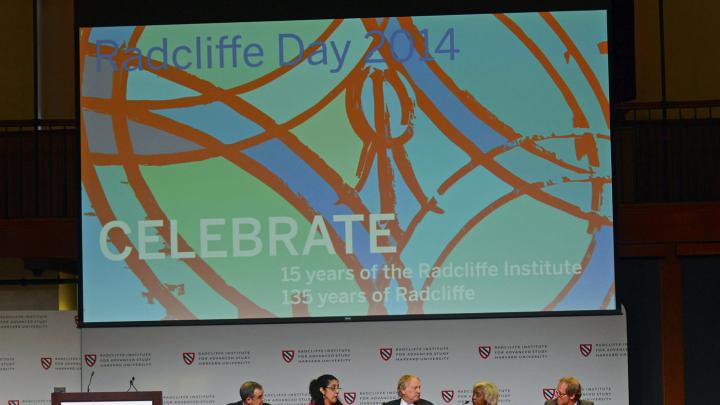The Radcliffe Institute for Advanced Study celebrated its fifteenth anniversary with a special, daylong series of events on May 30. In the Knafel Center that morning, the institute honored this year’s recipient of the Radcliffe Medal—its inaugural dean, Harvard’s current president, and Civil War historian Drew Faust—with a panel discussion that explored “From Civil War to Civil Rights: The Unending Battle to Vote.” Its focus, the program announced, was on “why and how the world’s greatest democracy has long struggled over which of its citizens can vote.” Progress toward universal suffrage has hardly been a forward march, as Radcliffe dean Lizabeth Cohen observed in her welcoming remarks, citing cases of regression in voting rights (see this article from the Harvard Magazine archives).
Freed professor of government Daniel Carpenter moderated the discussion, first noting that Faust’s own scholarship indicated that “the Civil War was fought over conceptions of humanity and citizenship—the recognition of African Americans as public political actors, as citizens.” He cautioned that even eras of American history known for social progress “were also often known as eras of widespread disenfranchisement.”
Boskey professor of law Lani Guinier spoke of a 1903 Supreme Court decision written by Oliver Wendell Holmes Jr. in which the high court allowed the state of Alabama to deny voting rights to blacks. Holmes declared that if the great mass of white people in that state did not want blacks to vote, there was nothing the Supreme Court could do. She praised the German system that gives everyone two votes: one for proportional representation and another to directly elect constituency candidates. Her overview of the long struggle for enfranchisement: “We keep doing the same thing and getting limited but helpful support, that then disappears. ” She mocked the states-rights adherents on this issue—saying, “Instead of the United States of America, we have the divided States of America”—and contrasted the domestic status quo with that of Canada, where “the census takers go out not only to take a census but to register people to vote. The Supreme Court would say, ‘That’s a violation of states’ rights.’”
Scheduled speaker Jacquelyn Dowd Hall, RI ’04, an historian at the University of North Carolina, was unable to attend; her husband, Robert R. Korstad, professor of public policy and history at Duke, joined the panel in her stead. He described how he and his wife had become involved in challenging current North Carolina legislation that limits voting rights in several ways: ending same-day registration, limiting early voting, and requiring a government-issued photo ID to vote. He said that “new code words,” including “the necessity of combating voter fraud” to “restore confidence in government,” reflected the same sentiments that nineteenth-century white segregationists had expressed regarding enfranchisement of blacks.
Darlene Clark Hine, RI ’04, Board of Trustees professor of African American studies and professor of history at Northwestern, spoke next. Her book Black Victory: the Rise and Fall of the White Primary in Texas (1979, revised 2003) reviews the history of primary elections that denied participation to black voters. “Every time a court would strike down the white primary, the Texas Democratic Party would come up with a new twist,” she explained. This led to a tortuous struggle against the system of disenfranchisement, which was meaningful because “the primary was the only election that counted. The general election just rubber-stamped the primary winner, so to be denied the right to vote in the primary meant you were denied a public voice.”
Writer Tony Horwitz, RI ’06, a Pulitzer Prize-winning journalist and author of several books, followed. He declared that today, “It’s the North, not the South, that looks like the laggard” in racial equality, and presented an array of facts to support that point. For example, in Charlotte, North Carolina, 30 percent of residential blocks contain both black and white households; the comparable numbers for Chicago and New York City are 6 percent and 4 percent.
He nonetheless remains optimistic about long-term, if not short-term, prospects, noting that approval of interracial marriage among Americans in polls stood at 4 percent in 1958 but had risen to 87 percent by 2012. The neo-Confederate surge he wrote about in Confederates in the Attic: Dispatches from the Unfinished Civil War (1998), he said, “was a doomed, rear-guard action,” and suggested that the efforts to suppress voting rights can be seen in the same light: “another desperate attempt to turn back the clock.” Horwitz observed that suburbs in South Carolina are integrating so rapidly that legislators can no longer gerrymander fast enough to keep up with the population. “Changes in demographics and attitudes,” he said, “mean that history is on our side.”








